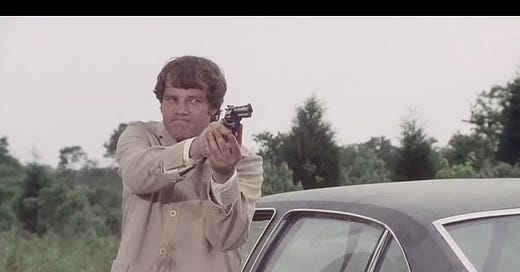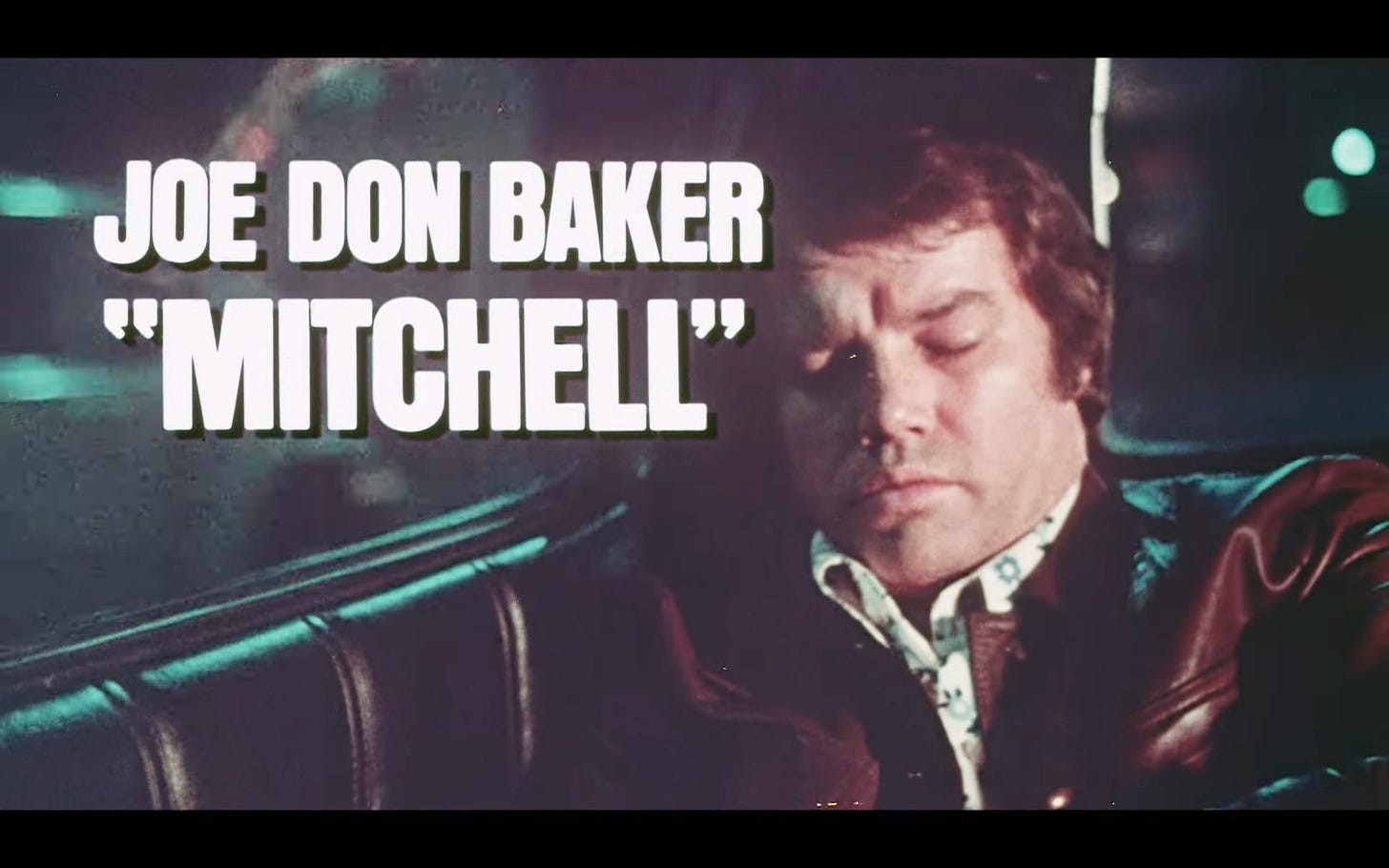The passing of Joe Don Baker inspired a little bit more of an outpouring on social media than I expected. Maybe I shouldn’t be surprised, since he definitely acted in a lot of movies that a lot of people have seen. People who grew up renting at Blockbuster might recognize him as the heavyset Texan from Fletch, The Natural, Cape Fear, Mars Attacks!, Cool Hand Luke, Congo, and three James Bond movies where he played two different roles. For a certain kind of cinephile, he’s best loved for his work with a murderer’s row of two-fisted directors in films and TV shows just outside the canon: Sam Peckinpah’s Junior Bonner, Don Siegel’s Charley Varrick, John Flynn’s The Outfit, Phil Karlson’s Framed, and Martin Campbell’s Edge of Darkness, among others. If you hail from a certain time and place, or you’re writing his New York Times obituary, his chief legacy is Walking Tall (1973), where he have a rootin’ tootin’ performance as a sheriff who did for the rural south what Dirty Harry did for the city.
But come on. If you’re reading this, I’ll bet you’re thinking about Mitchell (1975).
Directed with uninspired professionalism by veteran hack Andrew V. McLaglen, Mitchell is a standard cop-who-doesn’t-play-by-the-rules action movie that feels (as several contemporary critics observed) like a middling TV pilot, spiced with some R-rated violence. Its 2.8/10 average user rating on IMDB is entirely because it was resurrected from oblivion for a 1993 episode of Mystery Science Theater 3000, universally regarded by fans as one of the funniest. Neither MST3K nor Mitchell is mentioned in Baker’s New York Times obit, which is nice, in a way (he almost certainly didn’t want to be defined by that), but this really just proves how blind a big media org like the Times can be to the world. Look at the replies on any social media post about Baker’s death and you’ll find a sea of jokes that Joel, Tom Servo, and Crow T. Robot lobbed at him. Ask anyone who “Joe Don Baker” is and if they recognize the name, I’ll bet they start to smile.
From his Broadway debut in 1963 to his last role in Mud (2012), Baker enjoyed his most consistent success as a “tall, broad shouldered character actor with a southern drawl,” as his IMDB biography describes him. The out-of-nowhere success of Walking Tall sent his career on a bumpy detour into leading-man territory. The film was “suggested by certain events in the life of Buford Pusser, sheriff of McNairy County, Tennessee,” and Baker playing a highly fictionalized version of the lawman, who supposedly straightened out a vice-ridden small town armed with a little common sense and a big wooden stick. Director Phil Karlson was an old workhorse whose best movies, like The Phenix City Story, tended to be about corrupt systems enforced by violence. For Walking Tall, he neatly updated his concerns for the Silent Majority.
“The picture's crudeness and its crummy cinematography give it the illusion of honesty,” wrote Pauline Kael, who inadvertently pinpoints the film’s enduring pleasures: it really does feel like an ungentrified exploitation film that grew outside of Hollywood. The unpolished production found its ideal avatar in Baker, an unruly screen presence who was in many ways the anti-Clint: beefy instead of lean, loud instead of taciturn, expressive instead of wry and reserved. He grinned widely, laughed heartily, wept uncontrollably, and fumed with a rage that seemed to command every part of his sprawling body. In one of Walking Tall’s most memorable scenes, Pusser is on trial for the assault and battery of the vice-peddlers who tried to kill him. When he’s called to testify, he stands on his chair, tears off his shirt to reveal his stab wounds, and bellows, “If you let them do this to me and get away with it, THEN YOU'RE GIVING THEM THE ETERNAL RIGHT TO DO THE SAME DAMN THING TO ANY ONE OF YOU!” Clint was cool when dispatching justice, while Joe Don was hot – an unstable protector in a world off its axis.
Baker could channel that volcanic talent in many directions. The same year as Walking Tall, he was funny and menacing as the pipe-smoking assassin in Charley Varrick. A year before, he gave a sharp performance Junior Bonner as Steve McQueen’s brother, a slick, unctuous land developer who’s busy gentrifying the countryside. He was pungently charismatic – almost sexy, in an unpolished, overflowing kind of way – as Michael Douglas’ working-class friend in Adam at 6 a.m. But when Walking Tall briefly made him a star, it ended this streak of interesting work, and bought him a string of mostly-mediocre star vehicles.
There was Mitchell, of course (more on that in a minute). Checkered Flag or Crash (1977) was a forgettable car-race movie with Baker as a bootleg Burt Reynolds. Golden Needles (1974) was a boring Enter the Dragon clone by that film’s creative team, with Baker somehow tasked with filling in for Bruce Lee. He came to play, but couldn’t survive the turgid direction of Robert Clouse, whose camera was only ever interesting when Bruce Lee happened to be in front of it. That film’s martial-arts scenes didn’t play to Baker’s strengths the way that the bloody, sweaty brawls of Framed (1975) did. The uncut jewel of Baker’s stardom era, Framed reunited him with Walking Tall director Phil Karlson, and doubled down on that film’s southern texture, brutal violence, and paranoia about institutional corruption. It also mercifully lacked the earlier film’s right-wing moralism, and though superficially even shoddier-looking, Karlson’s camera better focuses on what’s important, such as the pockmarks and sweat on the film’s galaxy of ugly faces. I wish that even a fraction of the people who love MST3K would watch Framed.
I also wish they would spare 97 minutes to watch the uncut Mitchell. Not because it’s a particularly good movie, but just to illustrate how you can’t always judge a movie by its MST3K treatment. For one thing, the show cuts about 25 minutes of the movie, making its twisty plot an incoherent muddle (“Wasn’t John Saxon in this movie?” asks Tom Servo, as if they didn’t remove his death scene). They also do a disservice to Baker’s unusual and charismatic performance as a slovenly antihero with a streak of moral courage, talking in your ear from beginning to end about what a fat, sleazy prick Mitchell is as if Baker had played him this way by accident. MST3K was in the low-hanging fruit business, so a lot of their jokes are about Baker’s physique: he’s large in Mitchell, and by the time he starred in another MST3K target, Final Justice (1985), he had grown to be fat. Perhaps there’s an unconscious implication in the barrage of fat jokes that anyone who lets this happen to his body couldn’t be in control of his instrument. His southern accent inspires another kind of cultural chauvinism, as if someone who hails from below the Mason-Dixon line must be a savant and not a trained actor (in Baker’s case, an Actors Studio graduate).
Baker is said to have been upset about MST3K, and I believe it – but this is hearsay. He rarely gave interviews, never hit the convention circuit, and evidently drifted into a quiet retirement, with just a few notable roles after the turn of the millennium. With Baker a private citizen, it’s the Home Simpson-ish oaf of the MST3K meta-commentary that became his public persona. The Satellite of Love crew are very funny, of course; I’ve probably seen their Mitchell episode about 15 or 20 times across my chequered life, so they must be doing something right. But I think my good friend Dok845 had it right when he observed, “I think every MST3K fan has a defining memory of watching a real movie and going ‘Ha, there's Mitchell!...oh damn he's really great.’” I hope more people can have this epiphany.






